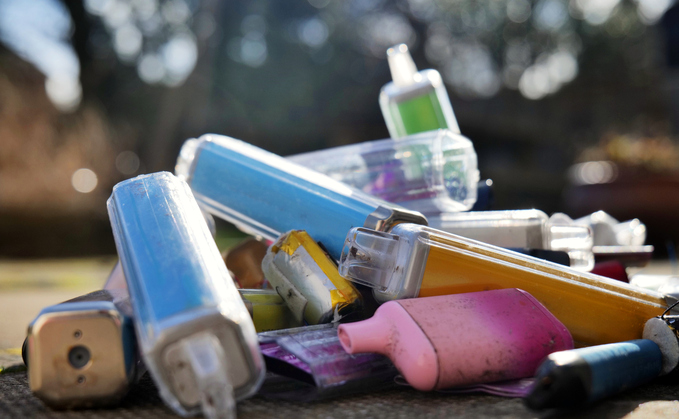Credit: iStock
Vast majority of vape firms falling short of e-waste standards, as sector prepares for more than a quarter of a billion devices to be thrown away this year
More than 90 per cent of vape retailers and producers in the UK are still failing to comply with takeback and recycling regulations, as the industry braces for the disposal of more than a quarter of a billion single-use devices ahead of a ban from 2025.
New analysis by Material Focus, the not for profit leading the Recycle Your Electricals campaign, has revealed what it describes as an ineffective system for managing vapes at the end of their life, highlighting how both producers and retailers are failing to meet their environmental obligations.
The study found 90 per cent of UK vape producers appear to be failing to fulfil legal obligations to pay for the collection and recycling of vapes - demonstrating no improvement since a previous study in 2023, which similarly revealed 90 per cent non-compliance with e-waste rules across the sector.
A poll of 764 high street retailers, convenience stores, and specialist vape outlets across 13 UK cities by Material Focus found that despite legal obligations being in place since 1 January 2021, just 86 stores - or 11 per cent of the total - provided recycling collection points.
Of shops visited as part of the research, vape drop off points were available in 33 per cent of 57 specialist vape retailers. However, high street brands provided few if any recycling drop-off points.
Material Focus also found that out of the 165 biggest vape and vape juice producers in the UK, just 15 had registered to comply with environmental regulations for producer responsibility for waste electricals, portable batteries, and packaging.
According to separate data, around 360 million disposable single-use vapes are sold in the UK each year, with more than five million thrown away every week – equivalent to eight per second.
If all of the 360 million disposable single use vapes bought in the UK per annum were recycled in line with takeback and recycling obligations it would collectively cost producers up to £200m each year, according to Material Focus.
Disposable single-use vapes contain toxic materials such as nicotine liquid, as well as metals such as lithium and copper which could be recycled for use in a broad range of emerging green technologies.
Scott Butler, executive director of Material Focus, described disposable single-use vapes as "one of the most environmentally wasteful, damaging and dangerous consumer products ever made", given their use of critical raw materials, pollution of land and waterways if discarded incorrectly, and creation of fire risks.
"The environmental responsibilities of vape producers and retailers are very clear," he said. "Any company that is producing significant quantities of electrical items is required to register, report their sales and finance the cost of their product being recycled.
"Retailers are also responsible for ensuring that it's easy for their customers to recycle these products by providing recycling drop off points in their stores. This isn't just an issue for specialist vape companies. Well known high street supermarkets, newsagents, petrol stations and convenience store chains are profiting from disposable vapes at significant cost to the environment and at major risk to the public and wildlife."
Sales of throwaway vapes are rising rapidly in the UK with YouGov polling in September indicating as many as 7.7 million single-use e-cigarettes are now being bought every week, stoking further concern about the mountain of resulting mountain of plastic and batteries waste.
At the time Material Focus claimed the lithium contained in vape batteries being thrown away each year was roughly equal to that required by 5,000 electric vehicles.
Butler described the lack of progress in tackling vape waste over the past year as "shocking".
"As sales and profits have boomed the environmental impacts and costs of collecting and recycling waste vapes have been disregarded," he added. "With the forthcoming ban on single-use vapes due to be implemented in 2025 it is vital that the quarter of a billion plus vapes, that could be thrown away in the run up to the ban, are instead collected for recycling and that we put in place an effective and accessible system for managing the recycling of new vape products, such as pods already coming onto the market."
Want to understand what is going on at the cutting edge of sustainability? Check out BusinessGreen Intelligence - the premier information for professionals focused on the UK's green economy.









